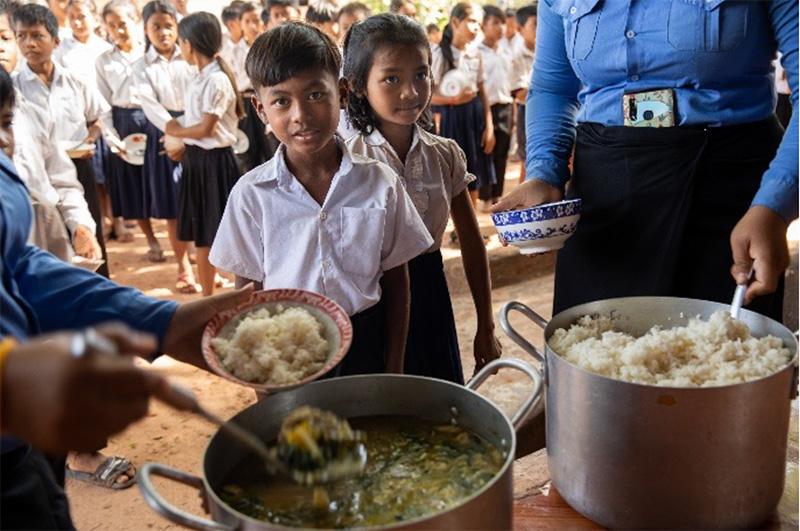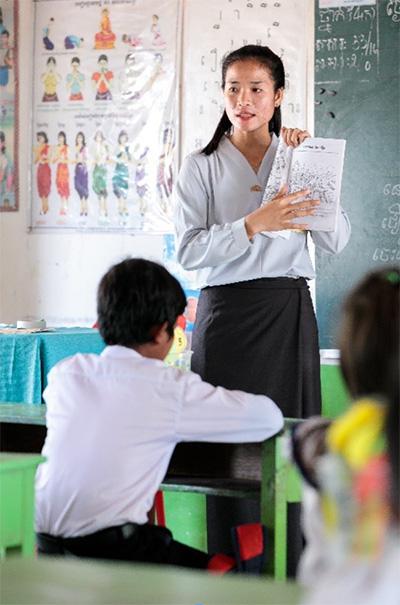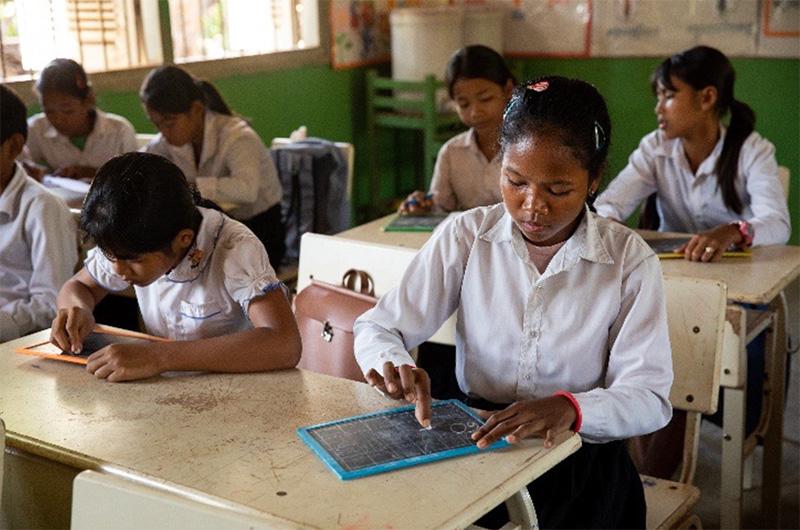
McGovern-Dole Success Story: School Feeding in Cambodia

There are two ongoing McGovern-Dole projects that are currently underway in Cambodia: a FY 2019 $19 million project and a FY 2022 $21 million project, both implemented by the WFP. Additionally, a 2019 $4.7 million USDA Local and Regional Food Aid Procurement project is also in operation. The McGovern Dole projects improve access to and the quality of education for 121,500 students (61,500 girls) in 448 primary schools in 24 districts in the regions of Siem Reap, Kampong Thom and Kampong Chhnang. USDA has been providing school feeding assistance to Cambodia since 2007 under the McGovern-Dole Program and the USDA Local and Regional Procurement project.
School feeding in Cambodia contributes to human capital development by improving access to education for pre-primary and primary school children, enhancing students’ nutrition and health status, and reducing short-term hunger. Both McGovern-Dole projects in Cambodia endeavor to improve the literacy, health, and nutrition of school-age children through providing and enhancing Khmer reading instruction and teacher training, providing daily school breakfast, and promoting healthy food choices, improved food safety, and WASH infrastructure and practices.

The support provided by McGovern-Dole has had a positive impact on the literacy levels of Cambodian school children. Notably, the integrated intervention of learning and nutrition, coupled with WFP support for the National Early Grade Reading Package, has yielded remarkable improvements in student performance. The number of students who were able to correctly answer 80 percent of the questions on the Early Grade Learning Assessment increased to 20.4 percent by the endline of the FY 2019 project compared to the baseline percentage of 6.3 percent.
As part of school-based WASH interventions, the McGovern-Dole projects continue to support the safe preparation and consumption of school meals and adequate hygiene by constructing and rehabilitating over 2,000 kitchens, storerooms, fuel-efficient stoves, and handwashing stations, equipping kitchens with over 772 utensils, and rehabilitating over 1,500 school gardens. Additionally, the McGovern-Dole funding has allowed the WFP to conduct food safety and program management training sessions for over 3,000 stakeholders, including school directors, cooks, storekeepers, and local authorities. Such training and subsequent coaching sessions contribute to strengthening the capacities of the local community involved in running the School Feeding program.

Furthermore, the McGovern-Dole funding has allowed the Government of Cambodia to strengthen the National Home-Grown School Feeding (HGSF) program in a number of key aspects, including program design and implementation capacity, budget planning and management, and monitoring and oversight. The McGovern-Dole projects work to enable the full transition of the National School Feeding Program to the Government of Cambodia by providing school meals in McGovern-Dole target districts while preparing schools to meet the three criteria for handover – capacity, infrastructure, and equipment. The McGovern-Dole projects also advocate to ensure school feeding is sustained through education, health, and nutrition activities within the national policies and frameworks such as the Education Strategic Plan, National Policy on School Health, and National Social Protection Policy Framework.
The government-managed national HGSF program expanded in 2023, reaching 427 schools and incorporating 137 additional schools from WFP. The Joint Transition Strategy endorsed by the Ministry of Education, Youth and Sport has guided this expansion, and the approved 2024 budget allows WFP to hand over 126 more schools to the government. In 2024, the national HGSF program aims to cover 553 schools or 50 percent of program schools. McGovern-Dole funding plays a key role in this transition process by providing essential support in policy, capacity strengthening, technical assistance, National Home-Grown School Feeding program design and implementation, and advocacy for program expansion.
The endorsement of a sub-decree on HGSF marks a significant step towards institutionalization and sustainability. Ongoing efforts in 2023, supported by McGovern-Dole funding, involve drafting and consultations for the National School Meal Policy, expected to receive endorsement by the end of 2024. In summary, the McGovern-Dole projects are pivotal in advancing the graduation of the school feeding program.
